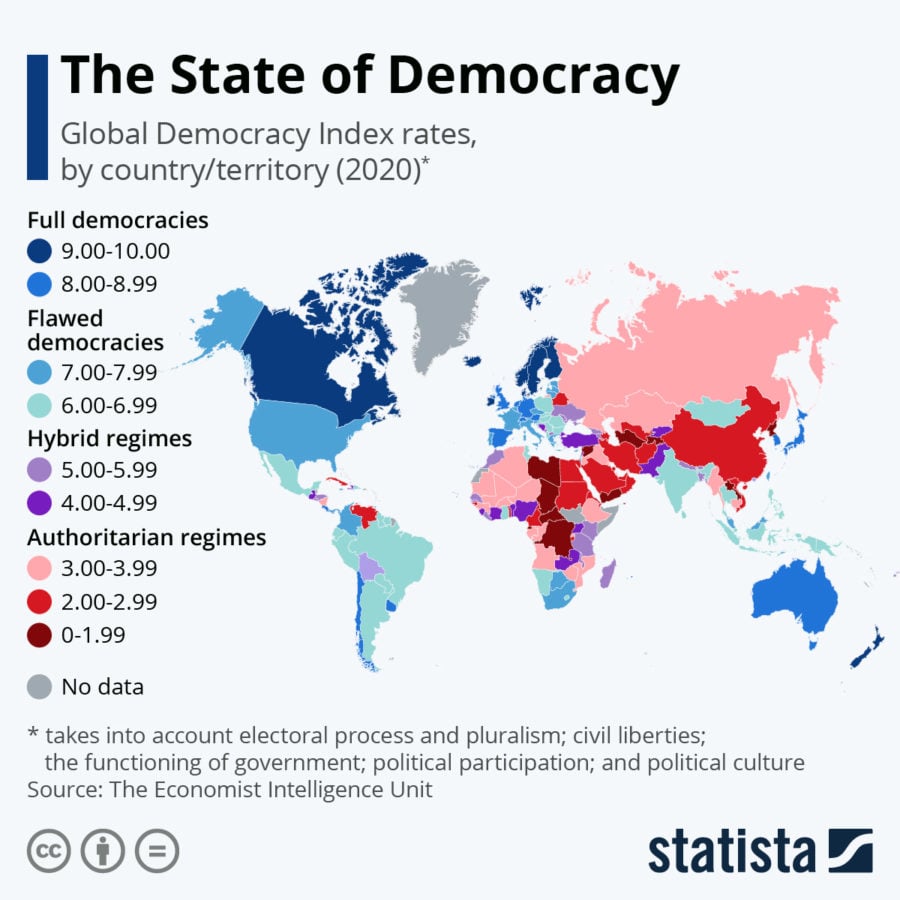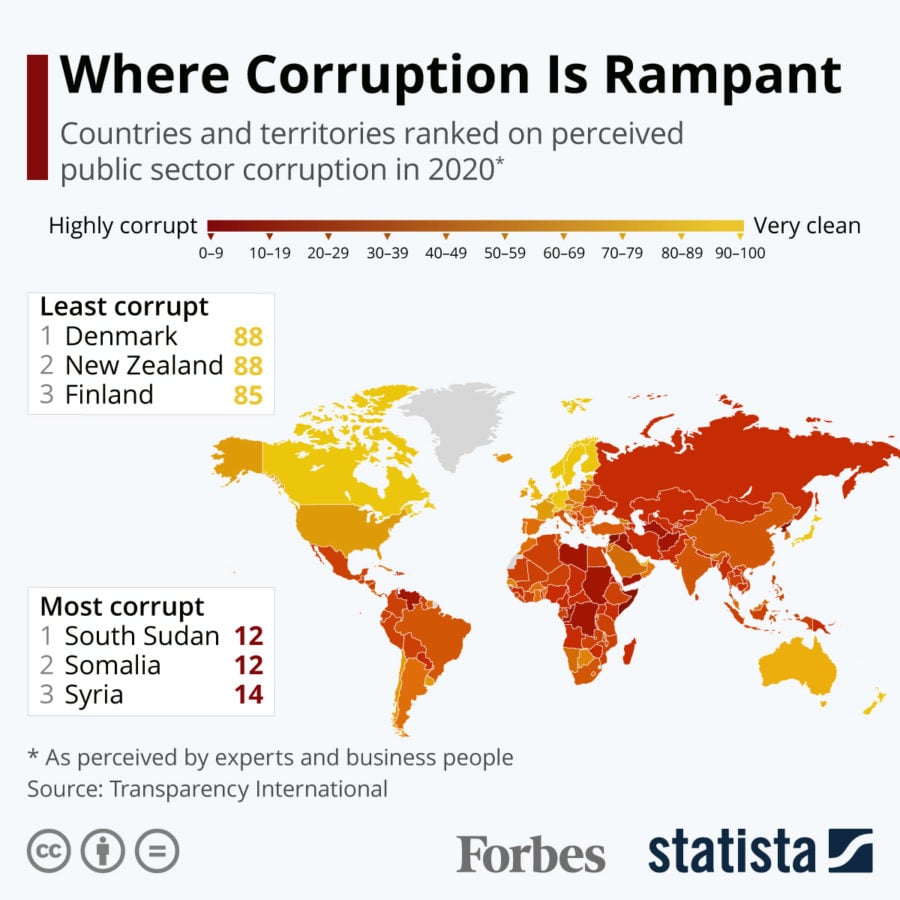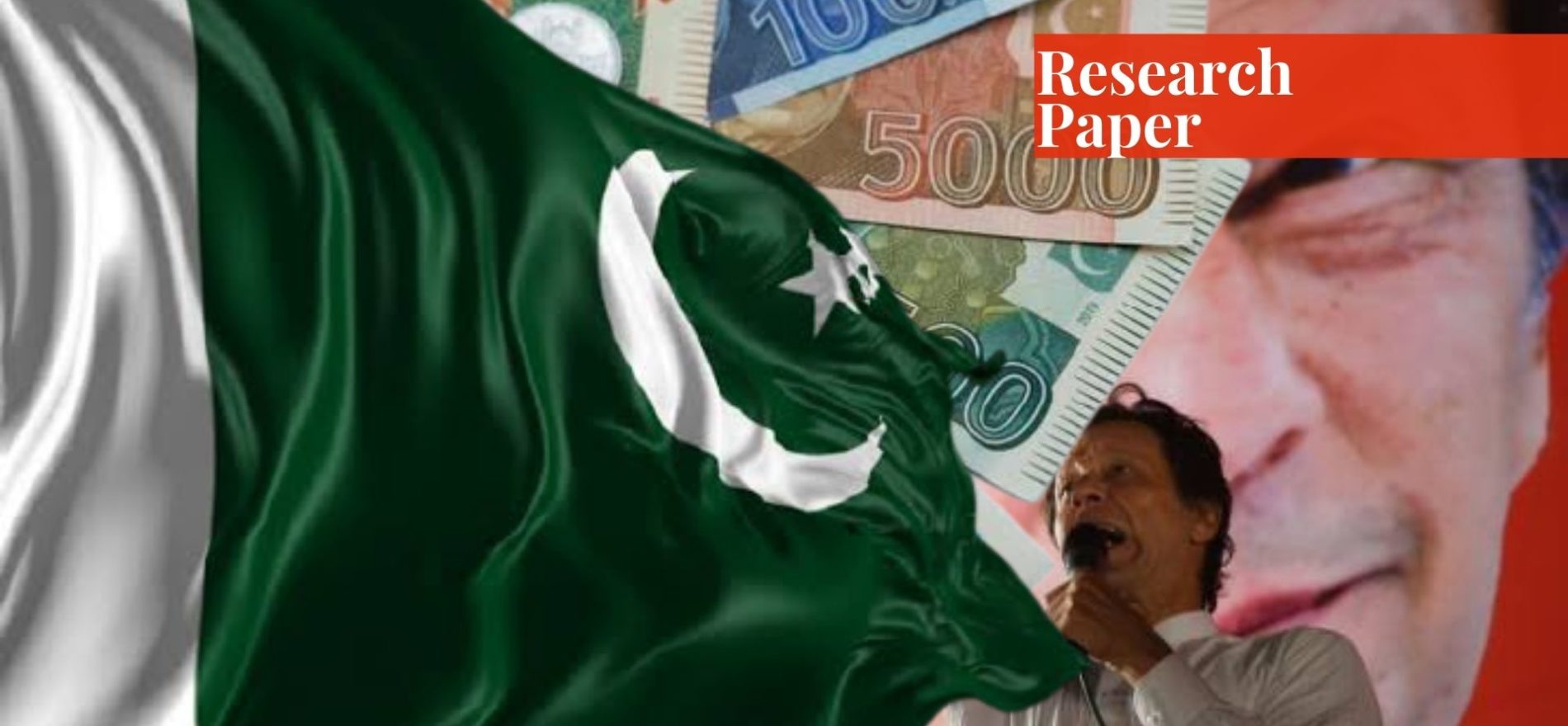Mr. Syed Taha Mehdi is a freelance writer and researcher with a keen interest in the fields of international relations and global politics, with a focus on the Middle East and South Asia. He graduated from Westminster Academy in 2021 after completing his A-Levels in social sciences and humanities. He intends to pursue international relations as his major in his undergraduate education.
Introduction
It would certainly not be a flawed argument if one was to argue that democracy is, in many aspects, the founding stone of the developed nations of the West. However, how far does an idealistic democracy with minimal corruption – the subsequent product of election transparency – guarantee the economic growth of a country?
Do elections without vices such as voter identification fraud, excessive rigging, and unhampered results guarantee the development of a country? Can countries without election transparency or democracy, develop at all, or are they destined for economic ruin?
Through an extensive and systematic analysis of available resources that enable us to reach a reasonable conclusion, we will answer the questions which matter most. Nevertheless, one thing is certain, the sacredness of democracy to the West. How sacred democracy is to the West can be evaluated by considering that 72% of American citizens supported the military intervention in Iraq in 2003, on the premise that Saddam Hussein was constantly undermining democracy and slowly solidifying his authoritarian rule at the expense of the native Iraqi populace (Newport, 2003).
Does a Perfect Democracy Guarantee Less Corruption?
Based on the Corruption Perceptions Index, and the Democracy Index published by Transparency International and The Economist, respectively, for the year 2019, it can be definitively concluded that some of the most flawless democracies in the world also tend to the least corruption. To confirm the findings, rigorous regressions have been made.

Norway, Iceland, Sweden, New Zealand, and Finland – countries leading the charts on the Democracy Index in the stated order – also find themselves on the Corruption Perceptions Index, in positions ranging from first (New Zealand) to eleventh (Iceland) (“Corruption Perceptions Index,” 2019; “Democracy Index,” 2020). The implication is clear and verified empirical data exists to validate these findings.
Indeed, nations deemed some of the healthiest democracies in the world tend to have the lowest levels of corruption in the world and considerable economic growth. The impact of lesser corruption, although an indicator of the development level of a given country, will be explored in greater detail later on.
Can Democracy be Exploited by the Powerful Elite?
A hypothesized statement has been making rounds recently. The statement, endorsed by several left-leaning authors, claims that the nations in greatest need of economic development – the so-called “Third World” – are plagued greatly with the issue of major income disparity. In the West, the ratio of the top 1% of the country controlling a disproportionate amount of wealth is one of the lowest in the world; only 11.3% of the wealth is in the hands of the wealthiest 1%.
Whereas, the statistics from Asia, Sub-Saharan Africa, and the Middle East and North Africa (MENA) region tend to be much less promising, with the richest 1% controlling 16.8%, 20.2%, and 22.9% of the wealth respectively (Ventura, 2021). These regions, which largely constitute most of the Third World, show themselves to be the largest hubs of income disparity in the world. It is quite easy to understand how the subsequent power this wealth may bring to the elite can be exploited for political gains.
In most of the developing economies of the world, considerable funds and donations are required to sponsor one’s electoral campaign and run for public office, and this wealth is only available to the fortunate few who form the top economic tier of society. Perhaps, this is adequate in explaining how wealthier individuals tend to dominate politics in the developing nations of the world.
For reference, it can be noted—through an official document published by the Election Commission of Pakistan (ECP)—that while the average net worth of a Pakistani member of the National Assembly (the 12th legislative assembly) had only been PKR 27 million in the fiscal year 2002-2003, this has nearly tripled in the span of half a decade.
By the dawn of the fiscal year 2008-2009, the average wealth of Pakistani lawmakers was understood to stand at PKR 81 million. The first part of this year began with the election of the Pakistan Peoples’ Party (PPP), an otherwise left-leaning party with socialist roots which is understood to draw most of its leadership from the feudal class of the province of Sindh (“Pakistani MNAs,” 2010).
Out of all the provinces of Pakistan, with Sindh ranked 2nd on the income and disparity index, it can clearly be seen that only the wealthy have been let into the political process in Pakistan. This disparity has taken an 11.8% hike from the data recorded between 1987-1988 and 2013-14, making a clear pattern (Junaidi, 2016).
Policies enacted by these individuals may often be beneficial, in any given capacity, to these elected officials themselves, or often their families, friends, and directly linked parties. Conflict of interest between the state and its leaders may arise, and these elected officials may tend to shape public policy around their business interests, often at the expense of the populace that has elected them. This may kick start a cycle of corruption that adversely impacts the economic growth opportunities of the country.
A notorious example of this is the Lahore metro bus project initiated by Muhammad Nawaz Sharif, upon his third ascension to the premiership in 2013. The project was estimated to have cost PKR 30 billion. Through publicized findings, it was later uncovered that a public tender had not been issued on the directions of the concerned provincial government led by Nawaz’s brother, Shehbaz Sharif. Rather, the steel had simply been purchased from the Sharif family’s own steel mill; collusion was alleged and for all the right reasons (“Metro Bus Project,” 2021).
The “Natural Experiment” Approach
Following the collapse of the Suharto regime in Indonesia, a political overhaul was initiated on a district level which sought to commence a new age for the country. It was soon discovered, through the direct comparison of data obtained from the Indonesian GDP and HDI figures, that the economy had indeed grown following the departure of local legislators who had been brought into power through elections rigged by the Indonesian military, on the orders of President Suharto.
Hence, the data explicitly went on to verify that election integrity did have a causal effect on the economic progress of a developing country and was indeed a major factor in the Southeast Asian state’s economic recovery (Moricz & Sjöholm, 2014).
Of the People, by the People, for the People
A sufficient amount of arguments have gone on to endorse the idea that an idealistic, healthy democracy enables the masses to willfully select and diligently monitor their leadership, ensuring that no corruption occurs and the economic growth persists. This may, in any way, pose a threat to the interests of the country as a collective unit. In a healthy democracy, to a great extent, the incentive to generate personal wealth at the expense of the public good is removed as governments are aware that their tenures are limited, reducing corruption. Furthermore, they may simply be voted out of office if any problematic scandals undermining their credibility may emerge.
The nature of this argument can be noted in the sector of corruption too, and much directly. Governments, per global average, tend to spend 15% of the GDP on third-party procurement, more commonly referred to as the obtaining of private contractors who may be hired for public programs on taxpayer money (Konanykhin, 2018).
The World Economic Forum reports that in the developing world, this percentage of the national GDP may even range between 15-30% on average. As per the UN’s Office on Drugs and Crime and the Organization for Economic Co-operation and Development (OECD), up to 25% of the value of government-issued public contracts – a whopping $2.35 trillion globally – may be lost to intentional inefficiency, fraud, waste, corruption, and abuse by government contractors (UNODC, 2021; “Preventing Corruption,” 2019).

Moreover, Transparency International has gone on to report that third-party procurement tends to be one of the governments’ “most economically significant activities” yet, it also remains the primary source of public sector corruption, which may hamper economic progress (“Corruption Perceptions Index,” 2019).
This corruption is understood to prevail through the “honor system”, which simply places the code of verification of the hours put in the hands of the government contractor, rather than having an empirical system of confirmation. Bearing in mind that the project that the contractor is tasked to complete is financed by public wealth, this leads to covert corruption and malpractice. Therefore, a greater share of the funds meant for economic growth and development gets exhausted due to the corruption in a weak democracy.
The implication, once more, is clear; the opportunity cost, whatever it may have been, is left untapped and the benefits the masses could have received are either reduced or not utilized at all, due to this corruption on the government level. This corruption may have remained unlikely in a democracy since the democratically elected government would supervise the projects, ensuring the economic growth of the state (Moricz & Sjöholm, 2014).
Do Elections Always Reduce Corruption?
It must be understood that the concept of democracy being a foolproof mechanism is not always true. Economists including Bardhan, Mokherjee, and Keefer have gone on to explain that even within the democratic process, there prevails the possibility of local-level elite capture through an implicit patron-client setting. Certain subsequent models applied through this idea have also gone on to allege that elections may even lead to lesser economic growth, due to prevailing uncertainty in the political system.
Alesina and Rodrik (1994), and Persson and Tabellini (1994) went on to use the median-voter model to suggest this theory, as well as other telling economic implications such as smaller income accumulation and unequal income distribution between the multiple socio-economic groups in society.
This perspective, however, looks into only one side of the argument. Multiple works have gone on to endorse the perspective that there is indeed a positive correlation between democracy and economic growth. Rodrik and Wacziarg (2005), Persson and Tabellini (2006), Papaioannou and Siourounis (2008), and Acemoglu et al. (2014), all go on to claim that democratic procedure can produce greater opportunities for transparency as well as greater conditions of impartiality in society.
They argue that the impartiality caused by the democratic procedures may lead to higher incomes in society, and an increase in the probability of reinvestment in the domestic market, leading to greater cash flow and spending of wealth. This subsequent wealth is understood to trickle down to lower-level socio-economic groups when those with higher earnings attempt to solicit greater amounts of goods and services. This may, thus, create a healthy economic cycle in the country, with positive implications for all members of society due to the improved economic conditions.
However, this model does not tend to be absolute for all case studies. The previously described effects tend to be majorly based on countries that have a direct regime change, be it from authoritarian to democratic or vice versa; examples of both have been observed in the past. For reference, this regime change may possibly come as a result of governance failure in authoritarian systems, as happened in Indonesia with the dusk of the Suharto regime (“Indonesia and Suharto,” 2008).
Following the rise of President Bacharuddin Jusuf Habibie and the formation of the Development Reform Cabinet, the subsequent democracy-based governance came with positive economic implications. However, the opposite may also be true as a greater economic success, despite democracy being in place, may bolster demand for greater social and economic freedoms such as the ones seen in the Soviet Union, Taiwan, and South Korea in the 1980s (“Perestroika,” 2019).
Furthermore, we can understand that there can also be the creation and prevalence of instances where the transition from authoritarian to democratic rule has led to minimal economic growth. Yet, that growth has resulted in an increase in literacy, followed by a demand for more personal freedoms, leading to the creation of a cycle that results in healthier democracies and more progressive economies. In its entirety, the proof at hand goes on to support this hypothesis.
Conclusion
Therefore, it can be concluded that greater democracy, indeed, leads to better prospects of economic growth due to the diminutive amount of corruption. However, the probability of this growth tends to be greater at the provincial and sub-divisional level, rather than at the national level. In the districts of Indonesia, clear proof, endorsing this theory, has been compiled through a close examination of growth rate prior to and following the provision of regional autonomy to the local territories.
The average growth rate in Indonesian districts between 2003 and 2007 was noted to be 5.3%, with a standard deviation of 1.7% (World Bank, 2021). However, it must be understood that although there is indeed an impact on economic growth, it may not be as significant as one may have previously perceived.
Several examples of economically developed regions have also been noted. Following regressions, it has often emerged that a state having a directly elected leader tends to have the same economic growth rate as a state with an indirectly elected leader. While in a democracy (the first scenario), the masses will be able to directly monitor corruption and the state’s economic growth and vote the concerned leader out, it may not always be the case with the indirect leader. It does, however, conclusively come down to the existing development-enabling infrastructure that may exist in a given factor (Batabyal, 2001).
Nevertheless, as proven with definitive evidence, a minimal corruption democracy – achieved ideally through impartial, free, fair, and transparent elections – produces the greatest results in terms of economic growth and is indeed a definitive factor in explaining the development that a country, existing in the described conditions, may face. The evidence provided speaks for itself, as it goes on to validate the described findings.
References
- Acemoglu, D., Naidu, S., Restrepo, P., & Robinson, J.A. (2015). Democracy does cause growth. Journal of Political Economy, 127(1). https://www.journals.uchicago.edu/doi/abs/10.1086/700936
- Alesina, A., & Rodrik, D. (1994). Distributive Politics and Economic Growth. The Quarterly Journal of Economics, 109(2), 465–490. https://www.jstor.org/stable/2118470.
- Batabyal, A. A. (2001). Development Microeconomics By Pranab Bardhan and Christopher Udry. Agriculture and Human Values, 18(3). https://www.researchgate.net/publication/226687194_Development_Microeconomics_By_Pranab_Bardhan_and_Christopher_Udry
- Corruption perceptions index. (2019). Transparency International. https://www.transparency.org/en/cpi/2019/index/nzl.
- Democracy index. (2020). The Economist. https://www.eiu.com/topic/democracy-index.
- How rich are Pakistani MNAs? (2010). The Express Tribune. https://tribune.com.pk/story/49699/how-rich-are-pakistani-mnas.
- Indonesia and the legacy of Suharto. (2008). Financial Times. https://www.ft.com/content/8d272038-cd9c-11dc-9e4e-000077b07658
- Junaidi, I. (2016). Economic inequality rising In Pakistan. Dawn. https://www.dawn.com/news/1274206.
- Konanykhin, A. (2018). How transparency can help the global economy to grow. World Economic Forum. https://www.weforum.org/agenda/2018/10/how-transparency-can-help-grow-the-global-economy/.
- Metro Bus bidding process was dubious: Gill. (2021). The News. https://www.thenews.com.pk/print/770612-metro-bus-bidding-process-was-dubious-gill.
- Moricz, S., & Sjöholm, F. (2014). The effect of elections on economic growth: Results from a natural experiment in Indonesia. Research Institute of Industrial Economics. https://www.ifn.se/wfiles/wp/wp1023.pdf.
- Newport, F. (2003). Seventy-two percent of Americans support war against Iraq. Gallup. https://news.gallup.com/poll/8038/seventytwo-percent-americans-support-war-against-iraq.aspx.
- Papaioannou, E., & Siourounis, G. (2008). Democratization and growth. The Economic Journal, 118(532). https://onlinelibrary.wiley.com/doi/abs/10.1111/j.1468-0297.2008.02189.x.
- Perestroika. (2019). History. https://www.history.com/topics/cold-war/perestroika-and-glasnost.
- Persson, T., & Tabellini, G. (2000). Political economics: Explaining economic policy. MIT Press. https://mitpress.mit.edu/books/political-economics.
- Persson, T., & Tabellini, G. (2006). Democracy and development: The devil in the details. National Bureau of Economic Research. https://www.nber.org/papers/w11993.
- Preventing Corruption in Public Procurement. (2016). Organization for Economic Co-operation and Development. https://www.oecd.org/gov/ethics/Corruption-Public-Procurement-Brochure.pdf.
- United Nations Office on Drugs and Crime (UNODC). (2021). Anti-corruption. https://www.unodc.org/southeastasiaandpacific/en/what-we-do/anti-corruption/index.html.
- Ventura, L. (2021). World wealth distribution and income inequality 2021. Global Finance. https://www.gfmag.com/global-data/economic-data/wealth-distribution-income-inequality.
- Wacziarg, R., & Rodrik, D. (2005). Do democratic transitions produce bad economic outcomes? American Economic Review, 95(2). https://www.aeaweb.org/articles?id=10.1257/000282805774670059.
- World Bank. (2021). The World Bank In Indonesia. https://www.worldbank.org/en/country/indonesia/overview.
If you want to submit your articles and/or research papers, please check the Submissions page.
The views and opinions expressed in this article/paper are the author’s own and do not necessarily reflect the editorial position of Paradigm Shift.



















